|
|
|
Sort Order |
|
|
|
Items / Page
|
|
|
|
|
|
|
| Srl | Item |
| 1 |
ID:
017157


|
|
|
| 2 |
ID:
181459
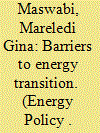

|
|
|
|
|
| Summary/Abstract |
Low carbon development involves profound changes in existing countries’ governing structures. Recent studies have shown that significant benefits to low carbon development in developing countries can be achieved from energy sector transitions. This paper argues that energy transition in Botswana which involves reduction of dependence on coal-generated electricity and increase in the uptake of solar energy can only be achieved through regime-based reconfigurations driven by deliberate government action and political will. It draws on energy transition literature to examine whether existing policy instruments can drive the desired transition. Through in-depth qualitative analysis, it identifies barriers that impede transition attempts to date. As an effort to overcome regime level barriers in particular, the paper proposes several low-cost changes in the existing electricity regime to facilitate a wider energy sector transformation.
|
|
|
|
|
|
|
|
|
|
|
|
|
|
|
|
| 3 |
ID:
110892
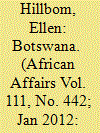

|
|
|
|
|
| Publication |
2012.
|
| Summary/Abstract |
Due to a combination of exceptional economic growth and social development, Botswana has been hailed as an African developmental state. This article rejects the developmental state theory and instead attempts to build an alternative theoretical model. It argues that from the 1930s until the present, Botswana has experienced a state structure characterized by natural resource dependency, lack of economic diversification, a dual society, selective social development and a close connection between the economic and political elite. In the tentative theoretical model presented and discussed here, these are all defining traits of a gate-keeping state. It is hence argued that while Botswana's socio-economic development since independence should in no way be underestimated, it is better understood as the efforts of a development-oriented gate-keeping state rather than a developmental state.
|
|
|
|
|
|
|
|
|
|
|
|
|
|
|
|
| 4 |
ID:
115828
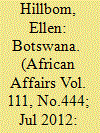

|
|
|
|
|
| Publication |
2012.
|
| Summary/Abstract |
I am delighted that my article 'Botswana: a development-oriented gate-keeping state' has instigated a debate with such a distinguished scholar as Ian Taylor. While post-independence Botswana is well known for economic growth, social development, and a maturing formal democracy, how we understand and interpret the drivers and substance of this success story has become increasingly controversial. I believe that instead of being content with Botswana's present achievements it is justifiable to ask: What is required for the country to erase poverty, develop its rural areas, achieve a diversified and sustainable economy and society, and become a high-income country characterized by modern economic growth, inclusive of social welfare and full political freedoms? It is in relation to such ambitions that it is imperative to understand the development potential of the existing state structure. I claim that with the present state structure there is significant risk that Botswana will stagnate rather than develop further, especially considering the possibility that the country will run out of profitable mineral deposits in the future and the militarization of politics that some argue is taking place under President Ian Khama.1 Given this, I argue that if the country is to continue and improve its development trajectory, structural change will be necessary. The facts of Botswana's post-1966 development have been presented in a rich body of literature and I do not believe that the controversy here is about the reliability of the facts. Instead, it is the interpretation of them and what inferences are to be drawn from them that is being discussed. This is far from a simple exercise in the sense that Botswana may not be a clear-cut case of any state model. Even Taylor himself writes that 'Botswana is an example of a state that has pursued certain policies … [which have led] … what might be …
|
|
|
|
|
|
|
|
|
|
|
|
|
|
|
|
| 5 |
ID:
115827
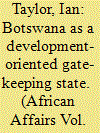

|
|
|
|
|
| Publication |
2012.
|
| Summary/Abstract |
Ellen Hillbom's contribution to the debate on the nature of the state in Botswana is most welcome.1 The relative success, despite important qualifiers, of Gaborone stands in stark contrast to many of its neighbours. Explaining this is important for studies of comparative African development. However, I disagree with Hillbom's negation of Botswana as a developmental state and her characterization of it as a gate-keeping state. Instead, I would argue that Botswana is an example of a state that has broadly pursued certain policies in the construction of a formative hegemony, to use Antonio Gramsci's concept.2 Doing so has led to what might be regarded as a developmental state to emerge - a state that pursues policies that coordinate investment plans; has a national development vision (implying that the state is an entrepreneurial agent); engages in institution building to promote growth and development; and, finally, plays a role in domestic conflict management.3 A key theorist of the developmental state, T. J. Pempel, indeed argues that 'These fusions of state and society are reflected in specific public policy profiles akin to what Antonio Gramsci called "hegemonic projects".'4
Six major components define the developmental state model: a determined developmental elite; relative autonomy; a powerful, competent and insulated bureaucracy; a weak and subordinated civil society; the effective management of non-state economic interests; and legitimacy and performance.5 Botswana's state since independence conforms to such indicators, managed by the Botswana Democrtaic Party (BDP).6 Its authoritarian nature alongside such features of its political economy is in keeping with 'typical' developmental states.7
|
|
|
|
|
|
|
|
|
|
|
|
|
|
|
|
| 6 |
ID:
061642
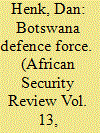

|
|
|
| 7 |
ID:
062051
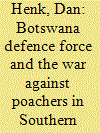

|
|
|
| 8 |
ID:
111609
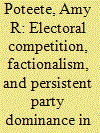

|
|
|
|
|
| Publication |
2012.
|
| Summary/Abstract |
The Botswana Democratic Party (BDP) has maintained a super-majority in the National Assembly for over forty years despite increasingly competitive elections. Several factors contribute to the BDP's continued legislative dominance, including features of the electoral system, fragmentation of the party system, and obstacles to strategic voting behaviour. Factional competition has played a particularly important role. Botswana's political institutions encourage factional competition, and factionalism interacts with the electoral system to hinder consolidation of the party system. Botswana's experience underlines the importance of internal party dynamics and their interaction with features of the electoral and party system in enabling the persistence of legislative dominance in competitive electoral systems.
|
|
|
|
|
|
|
|
|
|
|
|
|
|
|
|
| 9 |
ID:
143286


|
|
|
|
|
| Summary/Abstract |
Problems associated with environment and climate change have long been in the headlines. However, research on the effects that such problems might have on civil–military relations has been limited so far. This article examines civil–military cooperation caused by environmental problems in the recent decades particularly in developing countries. It employs Pion-Berlin and Arceneaux’s theoretical framework on military missions and civilian control and then looks at the case of Botswana. This article argues that the recent decade has seen an increase in civil–military cooperation due to new security concerns over environmental problems.
|
|
|
|
|
|
|
|
|
|
|
|
|
|
|
|
| 10 |
ID:
133619
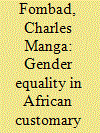

|
|
|
|
|
| Publication |
2014.
|
| Summary/Abstract |
The actual and perceived conflicts between customary law and human rights law, especially in issues dealing with gender equality, have remained a major challenge in Africa. Some of these conflicts are further complicated by the varying and contradictory interpretation of some customary laws by the courts. Different approaches have been adopted at different times and in different places to deal with some of these conflicts. One of the most controversial areas of customary law has been the traditional exclusion of women from property inheritance. This paper takes a critical look at how the courts in Botswana have dealt with the issue of the right to inherit the homestead or family home. It examines this issue in the specific context of the recent case of Ramantele v Mmusi in which the Court of Appeal had to consider the customary law rule of male ultimogeniture - which permits only the last-born son to inherit the homestead intestate to the exclusion of other siblings, especially females. It argues that courts need to be more proactive and progressive in their approach to dealing with such issues than they have been in the past in order to recognise the nature and extent of changes that are taking place today. The main lesson that can be drawn from the Botswana case is that if customary law is to survive and develop, more needs to be done to promote research and scholarship in this area and judges also need to take advantage of this research and deal with these customary law disputes with knowledge, understanding and sensitivity.
|
|
|
|
|
|
|
|
|
|
|
|
|
|
|
|
| 11 |
ID:
142510
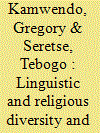

|
|
|
|
|
| Summary/Abstract |
Botswana, an African country, is characterized by linguistic and religious diversity. To this end, the paper assesses the extent to which the school curriculum accommodates and reflects the country’s linguistic and religious diversity. The paper argues that whilst Botswana’s Vision 2016 calls on the education system to accommodate linguistic diversity, the curriculum does not do so. Through the pursuit of a linguistic assimilation policy, the education system promotes and recognizes only one local language (Setswana), leaving other local languages out of the curriculum. In contrast, the curriculum houses a multi-faith religious education. This brand of religious education is an attempt to accommodate the religious diversity that exists in Botswana. Previously, schools had a mono-faith religious education syllabus. The multi-faith syllabus is considered to be a meaningful way of enabling learners to appreciate religious diversity.
|
|
|
|
|
|
|
|
|
|
|
|
|
|
|
|
| 12 |
ID:
079663
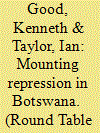

|
|
|
|
|
| Publication |
2007.
|
| Summary/Abstract |
Botswana is routinely celebrated as a 'model' for Africa and is habitually portrayed as an exception to the general slide to autocracy that has characterized much of post-colonial Africa. In fact, Botswana's polity is typified by an unaccountable president, an extremely weak civil society, and grotesque levels of inequality. There are growing indications that Botswana is descending to autocracy and arbitrariness and its democratic profile is in serious danger. Such realities are however seriously ignored by most academics, spellbound as they are by The African Miracle. When observers point out such anomalies, they are either physically deported from Botswana or banned from entering the country
|
|
|
|
|
|
|
|
|
|
|
|
|
|
|
|
| 13 |
ID:
137192
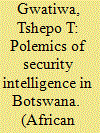

|
|
|
|
|
| Summary/Abstract |
This article discusses the validity of national security threats in Botswana and whether they justified the creation of the Directorate of Intelligence and Security Services (DISS), which has been controversial since its formation. Since its inception in 2008, the DISS has been accused of many human rights violations and politicisation. Without fully deliberating on the basis for its creation, some discourses have focused on the politicised operations without relation to what the DISS is supposed to be doing. The author works under the assumption that debates should be shaped by whether it was necessary to create the DISS, and, if so, how we can shape and steer debates on its oversight, management, reform and operations. This article argues that despite the politicisation of the DISS, Botswana's national security threats are both real and imagined; and that domestic threats to national security have moved from the conceptual ‘imagined’ category to the ‘real’. However, that in itself did not warrant the design and mandate of the DISS, and the article argues that it was external threats that really warranted the creation of a civilian intelligence agency. The article concludes that Botswana faces a plethora of external security threats – traditional and non-traditional – that warranted the creation and continuance of the DISS.
|
|
|
|
|
|
|
|
|
|
|
|
|
|
|
|
| 14 |
ID:
105406
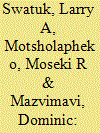

|
|
|
|
|
| Publication |
2011.
|
| Summary/Abstract |
Using a political ecology framework, this article describes the main developmental challenges facing communities living within the Boteti River sub-basin of northwestern Botswana. The data derive primarily from household surveys conducted over several months in 2008. They show that residents within the study area face significant challenges from unstable supplies of potable water and a highly degraded physical landscape. The article suggests that new opportunities for improved livelihood security have arisen with the recent return of the river to a perennial condition. For more than two decades, only a small portion of the river has had significant surface flow, with the rest dry year round. Given the area's proximity to landscape-dependent, wildlife-based tourism activity, the article suggests that the shifting basin hydrology presents sport-for-development agents with numerous opportunities for meaningful development interventions. In elaborating on what Coalter calls 'sport plus' and' plus sport activities', the article cautions that rural development undertaken in a context of abiding structural marginalisation is not for the faint of heart. Meaningful participation requires strategic intervention and long-term commitment of resources.
|
|
|
|
|
|
|
|
|
|
|
|
|
|
|
|
| 15 |
ID:
095469
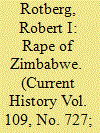

|
|
|
|
|
| Publication |
2010.
|
| Summary/Abstract |
Ending Robert Mugabe's purge of his country's human and physical capital will require more pressure smartly applied, particularly by neighboring nations.
|
|
|
|
|
|
|
|
|
|
|
|
|
|
|
|
| 16 |
ID:
062033
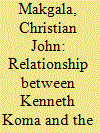

|
|
|
| 17 |
ID:
064822
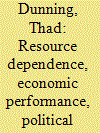

|
|
|
| 18 |
ID:
113887
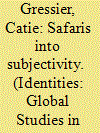

|
|
|
|
|
| Publication |
2011.
|
| Summary/Abstract |
The elite safari lodges in Botswana's Okavango Delta provide an intriguing site through which to explore processes of identity construction, as people from vastly different backgrounds meet and explore ontological possibilities through and against each other. Drawing on a dinner table dispute between an African American tourist and his white Motswana guide, I explore contested notions of what constitutes African identities. The encounter shows that colonial histories and the racialization of space continue to be central to African identity politics, and I describe how white citizens' claims to belonging are challenged on these grounds. In response to such challenges, white Batswana assert a strongly nationalistic identity, distancing themselves from other southern African white populations and their colonial histories. They staunchly defend their claims to belonging through mobilising a partial view of Botswana's history and contemporary sociopolitical conditions, which has made possible a deep sense of emplacement within the social and natural environments of the Okavango.
|
|
|
|
|
|
|
|
|
|
|
|
|
|
|
|
| 19 |
ID:
097746


|
|
|
|
|
| Publication |
2010.
|
| Summary/Abstract |
While wildlife is a valuable natural resource with several beneficial values to the people of Kenya and Botswana, wild animals in both countries usually cause damage to society in terms of attacks on people and livestock, damage to crops and other property such as infrastructure, and disruption of peaceful existence in local communities living in close proximity to wildlife areas. Wildlife damage would ordinarily result in people having negative attitudes towards conservation. Interestingly, however, people's perceptions of wildlife in these countries seem to be diametrically different in that whereas public attitudes in Kenya are generally negative, in Botswana they are remarkably positive. This study set out to establish the reasons for this variance in conservation attitudes. It established that the major cause for this variance in perception is that while in Kenya wildlife conservation is more often thought of in terms of wildlife welfare and hardly in terms of human welfare, in Botswana human welfare concerns have been mainstreamed in conservation efforts. People have, for instance, been allowed to derive direct benefits from wildlife through consumptive utilization, unlike in Kenya where only indirect benefits through non-consumptive uses are permitted. These direct benefits seem to mitigate the effects of wildlife damage, especially the resultant negative attitudes of people towards wildlife. The present and future survival of wildlife in many parts of the world, and especially in African countries such as Kenya and Botswana, depends to a large measure on the goodwill of the people, particularly local communities, in their everyday contact with it.
|
|
|
|
|
|
|
|
|
|
|
|
|
|
|
|
|
|
|
|
|